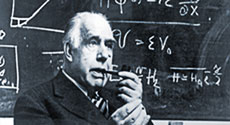SPECIAL Niels Bohr Lecture by Howard Stone, Princeton University
Soft materials, from biofluid mechanics to molecular biology
Abstract: Modern research questions in fields centered around biology, from molecular biology to bioengineering and biophysics, often require for their solution understanding of physical chemistry, the physics of soft materials, and the out-of-equilibrium conceptual framework that is part of classical mechanics, including hydrodynamics.
In this talk, I will try to sketch some of the ways in which classical concepts, extended to be applicable to the conditions relevant to biologically inspired questions, offer new insights.
We will touch on several themes, from larger than the scale of a cell to smaller than the scale of cell. For example, our studies have demonstrated, respectively, changes in wettability that can enable bacterial transport in porous materials, surface-attached bacterial cells that can “twitch” upstream in a channel flow, and that there can be transcriptional modifications that accompany swimming cells in channel flows.
Moreover, the modern revolution in sub-cellular biological condensates can be usefully viewed from the lens of physical chemistry and mechanics.
I will provide some examples and then show the link of condensates to the formation of the spindle in a dividing cell, which is a fundamental aspect of molecular biology.
Finally, if there is time, new ideas regarding the use of molecular rotors for measuring the viscosity of biological membranes will be explained. The work summarized above is drawn from many collaborations that I have had, including recently and back ten or so years.
About the speaker
Howard Stone is the Donald R. Dixon '69 and Elizabeth W. Dixon Professor in Mechanical and Aerospace Engineering at Princeton University.
His research has been concerned with a variety of fundamental problems in fluid motions dominated by viscosity, so-called low Reynolds number flows, and has frequently featured a combination of theory, computer simulation and modeling, and experiments to provide a quantitative understanding of the flow phenomenon under investigation. Recent research has extended his study of fluid dynamics and flow within microchannels to biological applications as well.
Stone was elected a Fellow of the American Physical Society in 2003. He was the first recipient of the most prestigious fluid mechanics prize, the Batchelor Prize 2008, for best research in fluid mechanics in the last ten years.
Stone was elected as a member of the National Academy of Engineering in 2009, a member of the American Academy of Arts and Sciences in 2011, a member of the National Academy of Sciences in 2014, and a member of the American Philosophical Society in 2022. In 2016, he was awarded the Fluid Dynamics Prize by the American Physical Society.
Coffee, tea and cake will be served outside Aud. A at 10:00
 Niels Bohr Lectures er en engelsk-sproget foredragsrække på Niels Bohr Institutet med kendte forskere fra hele verden.
Niels Bohr Lectures er en engelsk-sproget foredragsrække på Niels Bohr Institutet med kendte forskere fra hele verden.
Foredragene holdes cirka 10 gange om året og er offentlige. De er for studerende og ansatte ved Niels Bohr Institutet samt andre med interesse for at høre om videnskabelig forskning i verdensklasse. Foredragene holdes på et ikke-teknisk niveau, hvor de kan forstås af alle med en baggrundsviden, der svarer til de første år på fysikstudiet.
Tidspunkt og sted: Hvis intet andet er anført, finder foredragene sted kl. 15.15 i Margrethe Bohr Salen, Niels Bohr Bygningen, 2200 København N. Kaffe og kage serveres en halv time inden foredraget starter.
The lectures are public and held about 10 times a year. The lectures are for students and staff at the Niels Bohr Institute and others interested in worldwide scientific research. The lectures are held on a non-technical level where they can be understood by anyone with a background similar to the first year of physics study.
Time and place: Unless otherwise specified, the lectures take place at. 15.15 in Margrethe Bohr Salen, Niels Bohr Bygningen, 2200 Copenhagen N. Coffee and cake will be served half an hour before the lecture starts.
